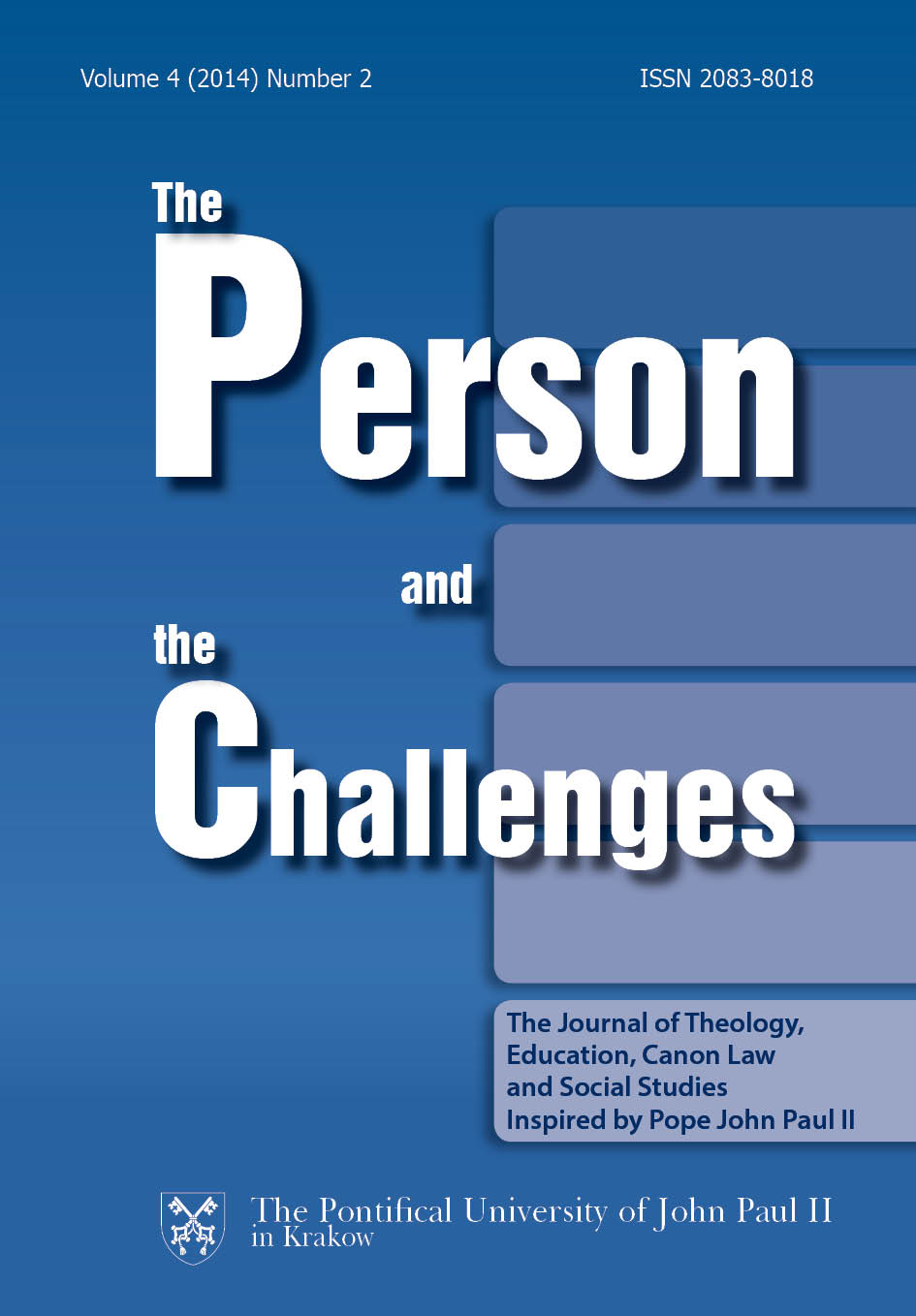Introducing Teenagers to a Dialogue with Judaism as the Task of School Catechesis
DOI:
https://doi.org/10.15633/pch.664Słowa kluczowe:
Polish Jews, German Jews, communism, Holocaust, survivors of the Holocaust, Lower Silesia, Poland, Jacob EgitAbstrakt
This analysis proves that introducing teenagers to a dialogue with Judaism is one of catechesis’s tasks. This task has been outlined in the post-conciliar documents of the Catholic Church. It underlines the spiritual ties between Catholic people and the Jews and promotes forming an attitude of openness towards followers of the Mosaic religion. It also contributes to mitigating anti-Semitism among Catholic teenagers. At the same time, it raises interest in Jewish traditions and culture. In the religion syllabus in lower and post-secondary schools we can come across numerous references (mainly indirect) to Judaism. The focus on passing honest knowledge about Judaism can be also clearly visible. In this way, formation of the cognitive element of inter-religious dialogue takes place. On the other hand, less attention is devoted to other components of this attitude such as the emotional and behavioural elements. That is why there is a demand to complete the lacking elements by watching films and having discussions. The above mentioned multimedia materials called “The religion lesson” have been prepared to satisfy this need.
Great importance is also attached to creating situations that allow Christian teenagers to participate in meetings with the Jews. It can be organized in the form of Days of Judaism and panel discussions with Jews and distinguished contemporary theologians and philosophers. Open meetings with representatives of Judaism are a great opportunity to perceive the Jews as “older brethren in the faith”. They let young people discover the cultural wealth and vision of Judaism and teach teenagers respect for the religious beliefs of the Jews. Thereby, they can contribute to the change of mentality of young participants of catechesis in their approach to Judaism. It is worth referring to the works of Jewish culture in these activities. It is the cultural heritage that comprises a great reference point to showing the strong Judaic roots of Christian culture. Thus, it is necessary, for the topics in Judaism proposed for religious syllabuses and catechetical material to be closely connected with organizing meetings of young Catholics with followers of the Mosaic religion. Only this kind of experience can contribute to an authentic inter-religious dialogue.
Bibliografia
Bałonak A., Zellma A., Lekcja religii 11. Etyka, Scenariusze lekcji religii do filmów, Poznań 2012.
Bałoniak A., Lekcje religii 13. Modlitwa, Scenariusze lekcji religii do filmów, Poznań 2013.
Bałoniak A., Zellma A., Lekcja religii 5. Księgi święte, Scenariusze lekcji religii do filmów, Poznań 2011.
Bartoszyńska J., Siuda T., Lekcje religii 9. Święta Żydowskie, Scenariusze lekcji religii do filmów, Poznań 2012.
Brzostowka M., Kubiak M., Lekcja religii 3. Seksualność, Scenariusze lekcji religii do filmów, Poznań 2012.
Chrostowski W., Na drogach dialogu Kościoła z Żydami i judaizmem, „Paedagogia Christiana” (2010), no. 2.
Chrostowski W., Stan dialogu katolicko-żydowskiego w perspektywie ogólnokościelnej i polskiej, www.mateusz.pl/czytelnia/wch-sdkz.htm (02.04.2014).
Chrostowski W., Żydzi i judaizm w nauczaniu Jana Pawła II: 1978–2005, Warszawa 2005.
Czajkowski M., 40 lat minęło od ogłoszenia „Nostra Aetate”, in: K. Konecki, Z. Pawlak, K.
Górzna S., Dzieci Abrahama: dialog Kościoła katolickiego z islamem i judaizmem w Polsce w okresie pontyfikatu Jana Pawła II, Słupsk 2013.
Jański M., Tykfer M., Lekcja religii 4. Dialog międzyreligijny, Scenariusze lekcji religii do filmów, Poznań 2011.
John Paul II, Posynodalna adhortacja apostolska o katechizacji w naszych czasach Catechesi tradendae (from 16 X 1979).
Komisja do Spraw Kontaktów Religijnych z Judaizmem, Wskazówki i sugestie w sprawie wprowadzania w życie deklaracji soborowej „Nostra aetate”, nr 4 (01.12.1974), Kraków 2003.
Komisja do Spraw Kontaktów Religijnych z Judaizmem, Żydzi i judaizm w głoszeniu słowa Bożego i katechezie Kościoła katolickiego. Wskazówki do właściwego przedstawiania tych zagadnień (24.06.1985) www.archidiecezja.warszawa.pl/upload/binaries/dokumenty/do
kumenty_stale/zydzi_judaizm_w_gloszeniu_slowa.pdf (02.04.2014).
Komisja Wychowania Katolickiego Konferencji Episkopatu Polski, Program nauczania religii rzymskokatolickiej w przedszkolach i szkołach, Kraków 2010.
Konferencja Episkopatu Polski, Dyrektorium Katechetyczne Kościoła Katolickiego w Polsce, Kraków 2001.
Kongregacja ds. Duchowieństwa, Dyrektorium ogólne o katechizacji, Poznań 1998.
Łukasiak M., Mikanowicz M., Lekcje religii 6. Post, Scenariusze lekcji religii do filmów, Poznań 2011.
Pilarczyk K. (ed.), Żydzi i judaizm we współczesnych badaniach polskich, vol. IV, Kraków 2008.
Rulka (eds.), Teologia Ekumenizmu. Kultura, Włocławek 2006.
Sobór Watykański II, Konstytucje, dekrety, deklaracje, Poznań 2002.
Stala J., Richtungsweisende Merkmale zur religiösen Erziehung und Bildung im Lehrwerk von Papst Johannes Paul II., „Bogoslovska Smotra“ (2014) Nr 1, p. 137–148.
Stala J., Katechese im Zeitalter der Postmoderne. „Grundsatzprogramm für die Katechese der Kirche in Polen“ aus dem Jahr 2010, „Bogoslovni vestnik“ 74 (2014) Nr 1, p. 107–117.
Wawrzyńska-Furman L. A., Judaizm a ekumenizm w świetle nauczania Jana Pawła II, Toruń 2009.
www.brewiarz.pl/czytelnia/judaizm.php3 (03.04.2014).
www.dialog.org/dialog_pl/dok-antysem.html (03.04.2014).
www.opoka.org.pl/biblioteka/W/WR/komisje_pontyfikalne/judaizm/pamietamy_19031998.html (03.04.2014).
Pobrania
Opublikowane
Numer
Dział
Licencja
Prawa autorskie (c) 2014 Agnieszka Ilwicka

Utwór dostępny jest na licencji Creative Commons Uznanie autorstwa 4.0 Międzynarodowe.
Autorzy publikujący w czasopiśmie udzielają jego wydawcy zgody o następującej treści:
- Autor zachowuje autorskie prawa majątkowe do utworu, a jednocześnie udziela wydawcy czasopisma zgody na jego pierwszą publikację w wersji drukowanej i wersji online na licencji Creative Commons Uznanie autorstwa 4.0 Międzynarodowe oraz zgody na wykonywanie opracowań, w tym przekładów.
- Autor ma możliwość udzielania zgody niewyłącznej na opublikowanie utworu w wersji, która ukazała się w czasopiśmie (np. zamieszczenia go w repozytorium instytucjonalnym lub opublikowania w książce), wraz z informacją o jego pierwszej publikacji w czasopiśmie.
- Autor może umieścić swój utwór online (np. w repozytorium instytucjonalnym lub na swojej stronie internetowej) jeszcze przed zgłoszeniem utworu do czasopisma.

